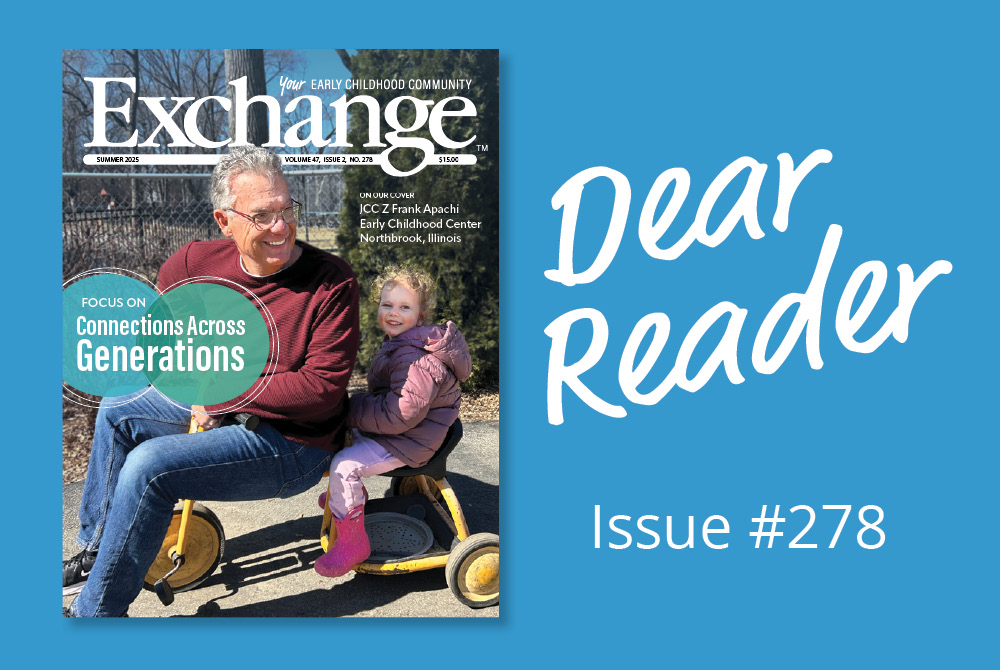 For many of us in North America, our first exposure to the Reggio Emilia approach came in the form of a Newsweek report in 1991 that shared the story of a different and exceptional way to work with young children. The report touted Reggio Emilia, Italy as a place where “each child’s special qualities are recognized and nurtured.” Since this report, the Reggio approach has grown in popularity and recognition, and many early educators have become enamored and inspired by it in multiple ways.
For many of us in North America, our first exposure to the Reggio Emilia approach came in the form of a Newsweek report in 1991 that shared the story of a different and exceptional way to work with young children. The report touted Reggio Emilia, Italy as a place where “each child’s special qualities are recognized and nurtured.” Since this report, the Reggio approach has grown in popularity and recognition, and many early educators have become enamored and inspired by it in multiple ways.
The Reggio approach in many ways is uniquely Italian. It is steeped in the culture of Italy, with its focus on dialogue, family involvement, and a deep understanding of how children engage in many languages of learning. Because of this, it is impossible to replicate the approach in North America, nor should we try. In fact, a key tenet of the Reggio approach is that culture and context are extremely important and meaningful to the way children learn. Programs must first look at and understand their own context, in order to determine how they will be inspired by the approach. For example, one of the schools in this issue is nature-focused. This is central to who they are, so any inspiration they take from the Reggio approach will be immersed in their study of nature.
ADVERTISEMENT
Unfortunately, in North America our educational systems do not always put the child at the center in the same way they do in Reggio Emilia. This can make it hard for educators to see how this wonderful approach can support their work with children. They admit that the Reggio approach might be the best approach to working with children, but they feel pressure to focus on test scores, standards, and educational frameworks. They cannot see how the Reggio approach could work for them, and they often think the approach is only for those educators who do not have to worry about these kinds of things.
This could not be farther from the truth! Yes, many private educational institutions do not have to worry about structured requirements, which can make it easier to adopt a Reggio inspired approach. However, standards and Reggio inspired practice are not mutually exclusive. Countless educators and schools who work within structured educational systems are also Reggio inspired! In fact, I work with many different programs that are Reggio inspired, from Head Start programs to Jewish day schools, and they often share how this work has made an impact on their staff, families, and children. Some of these programs are fully engaged in the approach and have completely changed their programs. Others are on a more moderate path to change, but each program has improved their understanding of child-centered practices and is inspired to continue improving this practice every day.
In this issue of Exchange, you will read many stories from unique and diverse settings. Authors range from those who are just starting to engage with the approach to those who have been studying it since 1991. These educators and the families they support represent a range of demographics and educational settings. There are Head Start educators, public school educators, private school educators, family child care providers, and even a digital learning educator. We hope that as you read through these stories, you are able to see a little bit of yourself in these programs, and see how Reggio inspired practice might just be right for you!
Angela Fowler
Executive Director, Cultivating the Early Years
Guest curator, Focus On: Reggio Inspired Practices in Diverse Contexts
Angela is the executive director of Cultivating the Early Years, an organization dedicated to supporting progressive education for young children. She has written on topics of authentic assessment, children’s rights, technology and progressive education for the early years. She is co-chairing the Voices of Children Committee and the Technology Working Group both working committees of the World Forum Foundation. She has worked in the field of education for more than 25 years and has participated in and coordinated seven study tours to Reggio Emilia, Italy. She is the co-founder of Cultivating the Early Years, where she consults on progressive educational approaches to technology for the early years, arts integration, math and science, parent engagement and much more.
Related
ADVERTISEMENT












